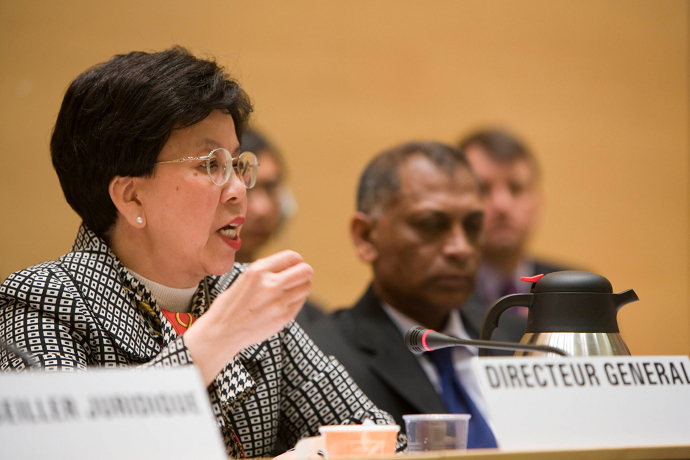Dr. Margaret Chan at the 2008 World Health Assembly. WHO photo.
The impact of climate change on human health
by Dr. Margaret Chan
Last year marked a turning point in the debate on climate change. The scientific evidence continues to mount. The climate is changing, the effects are already being felt, and human activities are a principal cause.
In selecting climate change as the theme for this year’s World Health Day, WHO aims to turn the attention of policy-makers to some compelling evidence from the health sector. While the reality of climate change can no longer be doubted, the magnitude of consequences, and — most especially for health — can still be reduced. Consideration of the health impact of climate change can help political leaders move with appropriate urgency.
The core concern is succinctly stated: climate change endangers health in fundamental ways.
The warming of the planet will be gradual, but the effects of extreme weather events — more storms, floods, droughts and heatwaves — will be abrupt and acutely felt. Both trends can affect some of the most fundamental determinants of health: air, water, food, shelter, and freedom from disease.
Although climate change is a global phenomenon, its consequences will not be evenly distributed. Scientists agree that developing countries and small island nations will be the first and hardest hit.
WHO has identified five major health consequences of climate change.
First, the agricultural sector is extremely sensitive to climate variability. Rising temperatures and more frequent droughts and floods can compromise food security. Increases in malnutrition are expected to be especially severe in countries where large populations depend on rain-fed subsistence farming. Malnutrition, much of it caused by periodic droughts, is already responsible for an estimated 3.5 million deaths each year.
Second, more frequent extreme weather events mean more potential deaths and injuries caused by storms and floods. In addition, flooding can be followed by outbreaks of diseases, such as cholera, especially when water and sanitation services are damaged or destroyed. Storms and floods are already among the most frequent and deadly forms of natural disasters.
Third, both scarcities of water, which is essential for hygiene, and excess water due to more frequent and torrential rainfall will increase the burden of diarrheal disease, which is spread through contaminated food and water. Diarrheal disease is already the second leading infectious cause of childhood mortality and accounts for a total of approximately 1.8 million deaths each year.
Fourth, heat waves, especially in urban “heat islands,” can directly increase morbidity and mortality, mainly in elderly people with cardiovascular or respiratory disease. Apart from heat waves, higher temperatures can increase ground-level ozone and hasten the onset of the pollen season, contributing to asthma attacks.
Finally, changing temperatures and patterns of rainfall are expected to alter the geographical distribution of insect vectors that spread infectious diseases. Of these diseases, malaria and dengue are of greatest public health concern.
In short, climate change can affect problems that are already huge, largely concentrated in the developing world, and difficult to combat.
On this World Health Day, I am announcing increased WHO efforts to respond to these challenges. WHO and its partners are devising a research agenda to get better estimates of the scale and nature of health vulnerability and to identify strategies and tools for health protection. WHO recognizes the urgent need to support countries in devising ways to cope. Better systems for surveillance and forecasting, and stronger basic health services, can offer health protection.
Citizens, too, need to be fully informed of the health issues. In the end, it is their concerns that can spur policy-makers to take the right actions, urgently.
The author is director-general of the World Health Organization (WHO) and these were her remarks on World Health Day (April 7, 2008).
Contact us by email at fund4thepanamanews@gmail.com
To fend off hackers, organized trolls and other online vandalism, our website comments feature is switched off. Instead, come to our Facebook page to join in the discussion.
These links are interactive — click on the boxes












